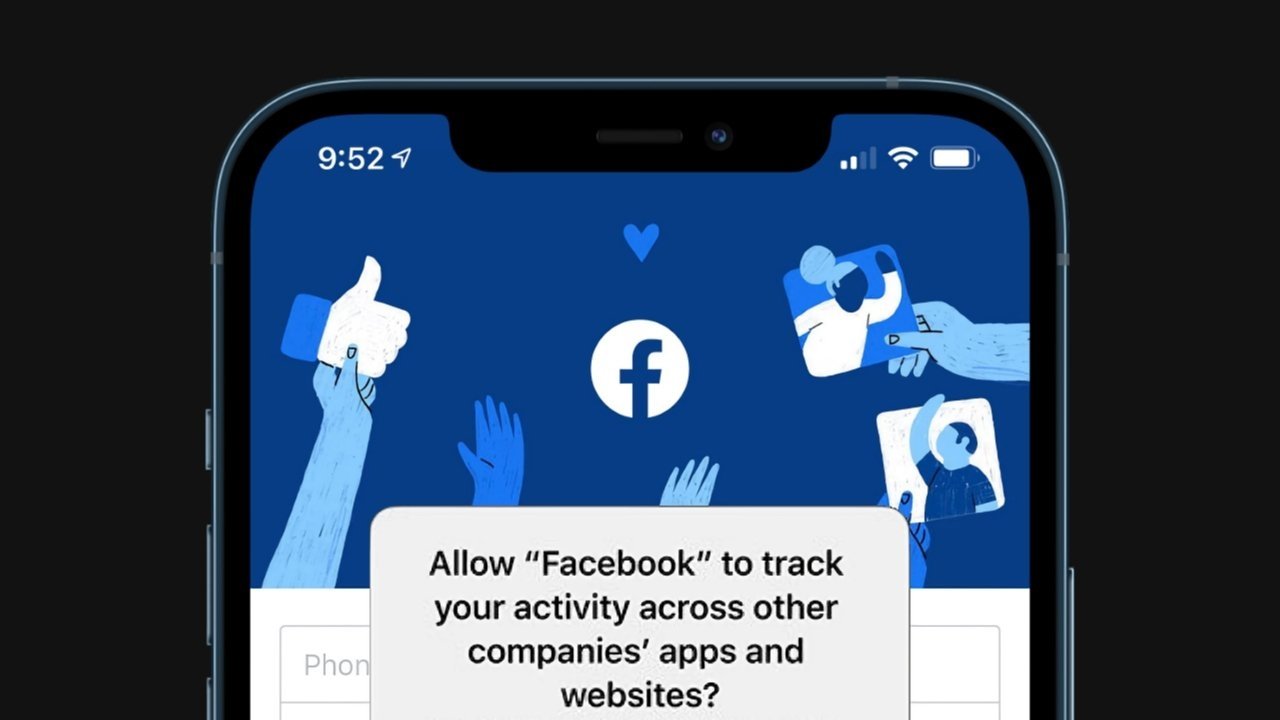The majority of iPhone users are asking companies not to track them when faced with an App Tracking Transparency privacy prompt, according to new data.
According to mobile app analysis firm Branch, iPhone users are opting in to tracking just 25% of the time. That low number is causing advertisers to panic, Bloomberg reported Wednesday.
"It's been pretty devastating for I would say the majority of advertisers," mobile analyst Eric Seufert told the publication. "The big question is: Are we seeing just short-term volatility where we can expect a move back to the mean, or is this a new normal?"
Facebook advertisers, in particular, are seeing a major impact from Apple's App Tracking Transparency (ATT) feature, which requires app and companies to obtain consent from users before tracking them across the web.
Media buyers who run Facebook ad campaigns say that the social media giant is no longer able to see how many sales clients are making. Because of that, it's more difficult to ascertain which ad campaigns are working.
Additionally, Facebook is less reliably able to provide detailed data on customer data. That includes purchase history, which Facebook uses to better understand a client's target market and provide data on "lookalike" audiences. Advertisers say that Facebook has stopped sharing detailed sales information for specific demographics, such as "women in Texas" or "men between 18 and 25 years of age."
The privacy feature also impacts what's known as "re-targeting," which is a term for advertisers showing ads to customers who had previously considered purchasing an item.
Branch estimates that roughly 75% of people have downloaded iOS 14.6, which was released in May and contains the ATT feature.
Facebook believes that ad performance will see fluctuations with the iOS privacy feature in the short-term, but the company doesn't seem to expect a noticeable long-term impact. It also said that it's working on new advertising tactics that require less data to measure ad campaign success.
"Apple's policy is hurting the ability of businesses to use their advertising budgets efficiently and effectively, and the limitations being created are driven by Apple's restrictions for their own benefit," said the Facebook spokesperson. "We believe that personalized ads and user privacy can coexist."
The Branch data comes just a day after a Consumer Acquisition executive revealed that certain advertisers are seeing a 30% to 40% drop in revenue.
Keep up with everything Apple in the weekly AppleInsider Podcast — and get a fast news update from AppleInsider Daily. Just say, "Hey, Siri," to your HomePod mini and ask for these podcasts, and our latest HomeKit Insider episode too.
If you want an ad-free main AppleInsider Podcast experience, you can support the AppleInsider podcast by subscribing for $5 per month through Apple's Podcasts app, or via Patreon if you prefer any other podcast player.
 Mike Peterson
Mike Peterson







-m.jpg)






 Christine McKee
Christine McKee
 Malcolm Owen
Malcolm Owen

 William Gallagher
William Gallagher



 Wesley Hilliard
Wesley Hilliard




-m.jpg)




7 Comments
Hooray! Keep your grubby, filthy hands off of my private data, you invasive ad-industry leeches! Instead, create ad campaigns and sell ads the way it had been done for eons. Hasn’t Zuckerberg ever watched Mad Men?!
As far as I can tell, the only metric they're employing is the ability to see how many people they've shown their ads to ... not how it's affecting sales.
So basically, it's just a number on a report.
Facebook and its ilk have brainwashed companies into thinking that that number on the report is the only metric which counts - whereas the actual effect of advertising on sales is just an unverifiable footnote.
Certainly targeted advertising should theoretically have a greater impact on sales than non-targeted advertising, but I don't know if that has ever been effectively verified. The fact of the matter is that the relationship between the number of ad impressions and sales is probably very very low, and I for one don't believe that targeted ads are really as effective as they're made out to be.
For my part, I notice targeted ads mostly after I've made a purchase, when annoyingly I see ads for something I've already bought for a fairly long time after I've made my purchase.
Who in God's name are these 25% that are allowing apps to track them? Lambs being led to the slaughter
(I find that 25% estimate way too high. IMO)
Satan’s little helpers, as the immortal Bill Hicks famously said.
This is just the first layer of impact of this. Over time, this likely is a significant loss of information previously being aggregated into "big data," and will probably be a significant degradation of not just individual ad targeting, but also all sorts of predictive analytics used for marketing, political chicanery and everything else.
This is why there's so much steam behind efforts to break open the iOS App Store. None of that is really about user choice and fighting monopolies and all that. There is just a lot of money that just wants to escape from this requirement to disclose user tracking practices and ask permission before doing it. These folks don't want more user choice; they want no user choice when it comes to opting not to be tracked as fodder for big data.